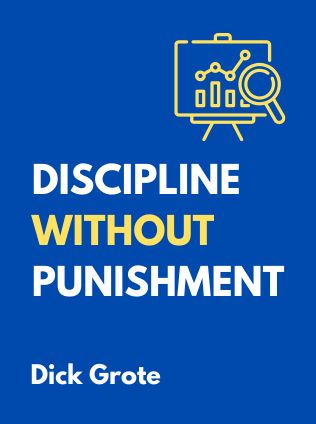
Discipline Without Punishment
The Proven Strategy that Turns Problem Employees into Superior Performers
By Dick Grote
Published 03/2006
About the Author
Dick Grote is an influential expert in the field of performance management. He is the author of several seminal books, including "The Complete Guide to Performance Appraisal," "The Performance Appraisal Question and Answer Book," and "Forced Ranking." As the Chairman and CEO of Grote Consulting Corporation in Dallas, Grote has developed the GroteApproach, a web-based performance management system. His work has been published in prestigious outlets like the Harvard Business Review and The Wall Street Journal. Grote's book, Discipline Without Punishment, has gained widespread recognition for its innovative approach to managing employee performance issues, advocating a shift from punitive measures to a more constructive and responsibility-based framework.
Main Idea
The core idea of Discipline Without Punishment is to replace traditional punitive disciplinary systems with a more constructive approach that emphasizes personal responsibility and decision-making. Dick Grote argues that the traditional methods of handling performance issues, which often rely on fear and punishment, are ineffective and can lead to negative consequences such as resentment and disengagement. Instead, he proposes a system that focuses on positive reinforcement and structured interventions to encourage employees to take ownership of their behavior and performance. This system is designed not only to address performance issues but also to foster a positive and productive workplace culture.
Table of Contents
- The Birth of Discipline Without Punishment
- Building Superior Performance
- Performance Improvement
- Discipline Without Punishment
- Solving Attendance and Attitude Problems
- Creating a Discipline Without Punishment System
The Birth of Discipline Without Punishment
In the opening chapter, Grote explores the historical context of traditional disciplinary systems, which have roots in union practices from the 1930s. These systems were designed to protect workers from arbitrary termination by implementing a series of escalating penalties. However, Grote critiques these systems for being overly punitive and not effective in fostering long-term behavioral change.
"The traditional progressive-discipline system... works no better than the criminal justice system works in transforming lawbreakers into responsible citizens." - Dick Grote
Grote introduces his Discipline Without Punishment (DWP) system, which retains the structure of progressive discipline but removes punitive elements. The system includes a focus on "Positive Contacts," where managers recognize and reinforce good performance. This approach shifts the focus from punishment to positive reinforcement and personal accountability.
how Positive Contacts can be implemented include:
Sign up for FREE and get access to 1,400+ books summaries.
You May Also Like
The Subtle Art of Not Giving a F*ck
A Counterintuitive Approach to Living a Good Life
By Mark MansonRich Dad Poor Dad
What the Rich Teach Their Kids About Money - That the Poor and Middle Class Do Not!
By Robert T. KiyosakiHow To Win Friends and Influence People
The All-Time Classic Manual Of People Skills
By Dale CarnegieQuiet: The Power of Introverts
The Power of Introverts in a World That Can't Stop Talking
By Susan Cain



















